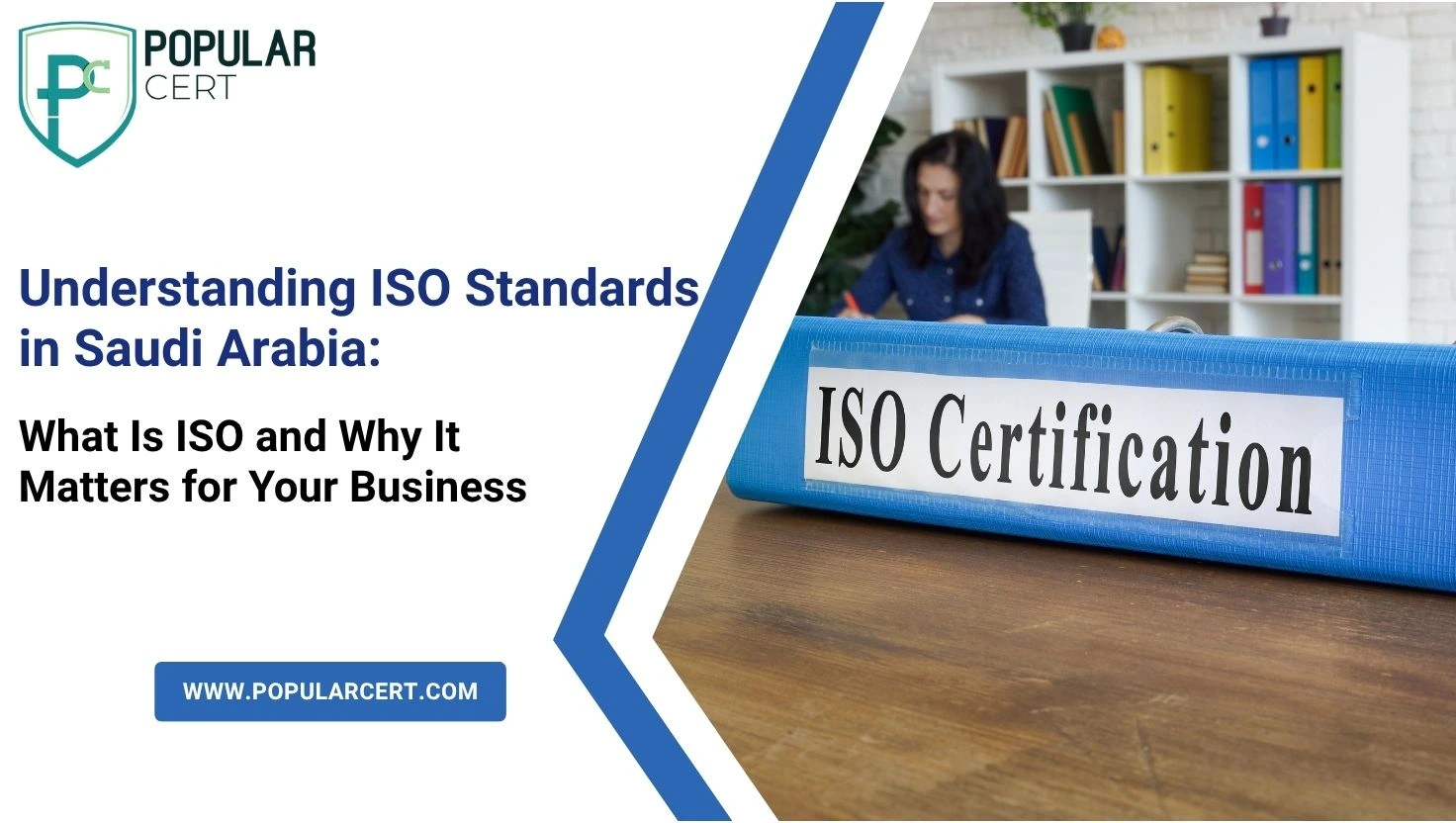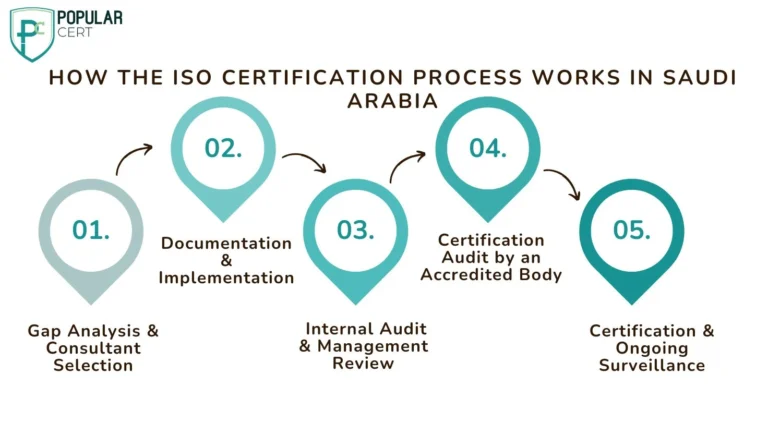Understanding ISO Standards in Saudi Arabia: What Is ISO and Why It Matters for Your Business

In a still-emerging and diversifying economy such as Saudi Arabia’s, ensuring quality, safety, and compliance is no longer negotiable. It is a necessity. Whether you are competing for a government contract, working toward entering global markets, or striving for operational improvements, obtaining an ISO Certification Saudi Arabia might just be the right move your business needs.
What Is ISO? A Simple Explanation
Meaning of ISO
ISO is an acronym for the International Organization for Standardization, a well-known entity with its head office in Geneva, Switzerland. ISO formulates and issues standards to guarantee quality, safety, efficiency, and interoperability in all industries and sectors across the globe.
The Standards are not laws that must be followed. However, if adopted voluntarily, or mandated by governing bodies, they aid in establishing frameworks for best practices in business.
Popular ISO Standards in Saudi Arabia
Below are some of the most commonly used ISO standards in the Kingdom:
- ISO 9001 – Quality Management System (QMS)
- ISO 14001 – Environmental Management
- ISO 27001 – Information Security Management
- ISO 45001 – Occupational Health & Safety
- ISO 22000 – Food Safety Management
- ISO 13485 – Medical Devices Quality
The different standards focus on a specific area within an organization. Saudi Arabian businesses, like any other modern business, fully understand the importance of maintaining compliance as well as a competitive edge in the market which is the main reason why they pursue multiple certifications.
Why is ISO Certification Important for Saudi Businesses
- Enhances Credibility and Trust ISO certification is recognized globally. Saudi stakeholders and clients especially find it useful as it attracts government contracts that come with tenders requiring ISO certification.
- Improves Operational Efficiency Businesses adopting ISO standards experience process automation, less operational errors, higher efficiency, and more staff accountability. All of which provides cost and performance benefits to the business.
- Enables Global Market Access Certified businesses gain global acceptance and trust when offered products or services which makes them put less effort into receiving permission for exports.
-
Ensures Regulatory Compliance in Saudi Arabia
- SFDA for Pharmaceuticals and food safety
- SASO for technical regulations and consumer protection
- MISA for foreign investment requirements
Companies that operate in these sectors benefit from reduced fines, delays, or legal challenges due to certification especially when working within heavily regulated regions.
Types Of Certification
- ISO Certification
- ISO 9001 Certification
- ISO 14001 Certification
- ISO 45001 Certification
- ISO 22000 Certification
- ISO 27001 Certification
- ISO 17025 Certification
- ISO 13485 Certification
- ISO 20000-1 Certification
- ISO 22301 Certification
- ISO 50001 Certification
- ISO 37001 Certification
- IATF 16949 Certification
- ISO 29001 Certification
- ISO 31000 Certification
- ISO 20121 Certification
- ISO 10002 Certification
- ISO 41001 Certification
Get Free Consultation
Our Clients


















Who should obtain an ISO Certification in Saudi Arabia?
The objective here is to help businesses from various sectors understand ISO certification and the value it adds to their business operations. It positions ISO not merely as a necessity but a strategic asset.
Manufacturing & Construction
As part of Vision 2030, Saudi Arabia’s industrial sector is booming. The sectors are served with ISO 9001 (Quality), ISO 14001 (Environmental), and ISO 45001 (Occupational Health & Safety) to:
- Achieve product quality and rework targets
- Fulfill compliance in Government tender servicing
- Improvement on site safety and environmental performance
Healthcare & Pharmaceuticals
Every healthcare and pharmaceutical company is under rigid regulation by SFDA (Saudi Food and Drug Authority). ISO 13485 and ISO 9001 help to:
- Guarantee the patients’ safety and the quality of products offered
- Fulfill required processes and documentation compliance
Information Technology & Cybersecurity
With the rapid rate of digitization in the economy, ISO 27001 for information security is important. It helps to:
- Sharpen the protection of sensitive information from breaches
- Bolster confidence among other business partners for fintech, cloud services, e-commerce businesses, etc
Food Production & Hospitality
With Saudi Arabia particularly eager to develop these sectors, ISO 22000 assists to:
- Adhering to the systems in place for managing food safety is critical for any business.
- Reduction in cases of contamination and the need to recall products.
Oil & Gas Sector
Oil and gas companies in Saudi Arabia still drive the economy. They actively use ISO 9001, 14001, and 45001 in order to:
- Minimize the impact of business operations on the Environment
- Promotion of safe working conditions and businesses.
- Managing intricate and complex workflows efficiently.
Startups & SMEs
Small and medium enterprises gain from ISO by:
- Winning the trust and confidence of customers.
- Accessing better tender and partnership opportunities.
- Creating efficient and scalable business processes from the outset.
The ISO Certification Process in Saudi Arabia
This part focuses on directly addressing the concerns of our audience in regard to obtaining an ISO certification. Many readers feel overwhelmed by the term ‘certification’ so this breakdown clarifies hesitation leading to higher conversion.
Step by Step Breakdown
Every pair involves certification’s life cycle alongside popularcert’s role.

- Gap Analysis
- Establish where you do not meet ISO standards within your organizational processes.
- Helps in efficiently planning for work required before certification.
- Documentation
- Draft processes and policies alongside the requisite paperwork dictated by the iso standards.
- Forms must to be templates and procedures must to be nonfiction, practiced corporately.
- Implementation
- Put the documented systems into practice across the organization.
- Train employees and create a climate for awareness.
- Internal Audit
- Perform an internal review to ensure all ISO standards are met internally.
- Resolve issues prior to the external audit.
- Management Review
- Completing this step allows upper management to assess system efficiency and preparedness.
- Demonstrates dedication towards the organization and advancement.
- External Audit
- The audit is performed by an external certifying agency.
- Often consists of a two-step approach: assessing documents first, then evaluating on-site.
- Certification
- Certification is granted upon successful completion of the audit. It is valid for three years.
- To retain certification, surveillance audits are performed every year.
Cost Factors
Changes based on:
- Consultant or in-house preparer
- Number of sites and employees
- Type of ISO standard(s)
Most Saudi companies invest in ISO due to high returning investments caused by enhanced operations and increased contracting done afterwards.
Choosing the Right ISO Standard for Your Business
Here’s a quick guide:
Business Goal | Recommended ISO Standard |
Improve product/service quality | ISO 9001 |
Manage environmental impact | ISO 14001 |
Secure information and data | ISO 27001 |
Ensure employee safety | ISO 45001 |
Guarantee food safety and hygiene | ISO 22000 |
Manufacture medical devices | ISO 13485 |
Some companies also opt for an Integrated Management System (IMS) that combines two or more standards for a streamlined approach.
Common Myths About ISO Certification
“ISO is only for big companies.”
This is a misunderstanding because more and more small and mid-sized businesses in Saudi Arabia are becoming ISO certified.
“It’s just about documentation.”
This is incorrect because with ISO, companies focus on achieving operational improvements and not merely on completing documents.
“Certification is forever.”
This is inaccurate because there are ongoing requirements to complete surveillance audits each year, and recertification is needed every three years.
How ISO supports Saudi Vision 2030
Saudi vision 2030 aims at innovation, sustainability, digital transformation, and quality in all aspects. These objectives are supported through ISO standards by:
- Fulfilling strategic and sustainable business operations
- Facilitating international commerce and collaborations
- Encouraging sustainable and ecological stewardship within the corporate world
- Strengthening cybersecurity and the overall structure of information systems frameworks
Sectors such as healthcare, food, ICT, and renewable energy are urged to adopt ISO standards.
Why Choose a Local ISO Consultant in Saudi Arabia
- Regulatory Expertise
Consultants must satisfy local Saudi requirements SFDA, SASO, MISA within the scope of national regulations, making sure that the certification fulfills ISO and local law needs.
- Familiarity with the Community
Receive bilingual documents along with training and workshops relevant to Saudi culture.
- Faster Results
Reach certification faster with streamlined processes from planning, support, to post-certification. Local consultants reduce errors and expediate timelines.
Ready to Get ISO Certified in Saudi Arabia?
Whether you’re launching your ISO journey or upgrading your existing system, now is the time to act. Certification is more than a compliance tool—it’s a powerful asset for growth, reputation, and global expansion.
Partner with Popularcert – Your Trusted ISO Experts in Saudi Arabia
At Popularcert, we offer end-to-end ISO certification services tailored to Saudi businesses. From documentation to audits, we ensure a smooth, efficient, and cost-effective certification experience.
GET A FREE CONSULTATION NOW
FAQs
What is ISO Certification and why is it important in Saudi Arabia?
ISO Certification is proof that a business meets international standards for quality, safety, or efficiency. In Saudi Arabia, it helps companies comply with regulations, win tenders, and expand globally.
Which ISO standard is most suitable for my business?
It depends on your goals—ISO 9001 is ideal for quality management, ISO 27001 for data security, ISO 22000 for food safety, and ISO 45001 for employee safety. A consultant can help you choose the right one.
How long does it take to get ISO Certified in Saudi Arabia?
Most businesses can achieve ISO Certification within 1 to 6 months, depending on company size, standard complexity, and implementation readiness.
Is ISO Certification mandatory in Saudi Arabia?
ISO is not legally required in all sectors, but it is often mandatory for government contracts and regulated industries like healthcare, construction, and food production.
Who provides ISO Certification in Saudi Arabia?
ISO Certification is issued by accredited third-party certification bodies. For smooth and fast certification, businesses often work with experienced consultants like Popularcert.
